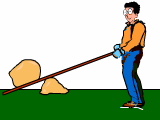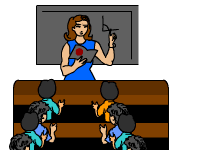One of the great inequities at the University where I teach is the failure of our administration to formally acknowledge the hard work done by our lecturers (a/k/a adjunct faculty). These are the faculty who teach many of our General Education (GE) courses. They teach up to 5 courses per  semester and earn less than tenured/tenure-track faculty. They are usually the first faculty our first time students meet. They often have other full-time jobs to supplement the income they receive from teaching. Yet they are the unsung workers who help trigger and encourage student learning.
semester and earn less than tenured/tenure-track faculty. They are usually the first faculty our first time students meet. They often have other full-time jobs to supplement the income they receive from teaching. Yet they are the unsung workers who help trigger and encourage student learning.
Apparently, our University is not alone in its unfair treatment of adjunct faculty. In the Chronicle of Higher Education, writer Michael Stratford, in a piece titled: Accidental Activist Collects Data on Adjuncts, discusses the research and conclusions of Joshua A. Boldt, an adjunct faculty member at the University of Georgia. Boldt’s conclusions (based on information you can view from this publicly editable spreadsheet): many adjuncts are treated poorly: lower pay, higher teaching loads and general disrespect from tenured/tenure track faculty and administration. So our University is not alone in failing to acknowledge lecturers’ contributions.
There is one way to acknowledge the work done by lecturers: visible awards.
Why Not an Award for Lecturers (Adjunct Faculty)?
My institution is a unionized campus. During most years, union contracts, negotiated between the teachers’ union and central administration, define our responsibilities and compensation. (Right now, teachers are working without a contract. Apparently two sets of  educated minds cannot agree on what is the best pay/performance contract in tight budget times.)
educated minds cannot agree on what is the best pay/performance contract in tight budget times.)
Part of the Issue: Our Institution Has No Money, So No Rewards
Not all rewards need to be paychecks. The Provost award, given annually, is a prestigious award for faculty. The Provost actually has created and gives several types of awards. These awards are for outstanding teaching, research, service, assessment (new this year), and promising new (tenured/tenure track) faculty. The glaring omission in the list of Provost’s awards is an award for adjunct faculty (we call them lecturers).
Why Don’t Lecturers Just Apply for Awards?
You may say the list’s omission of lecturers is an oversight. After all, at our institution, as of 2011, 55% of the teaching faculty were lecturers. Note that at some institutions, more than 70% of the courses are taught by part-time or adjunct faculty. So you might think the 55% would be eligible for any one of the Provost’s awards.
You’d be wrong. They are not. They were neither welcomed nor permitted to apply.
How do You Know Lecturers are Not Eligible for Awards?
A colleague and I tested that once, approximately 4 years ago. We applied for a Provost award for service. She and I (a tenured full professor) had built and delivered plagiarism workshops to assist students (and faculty) on campus. We’d delivered the workshops to more than 2,000 students at that point. So, we applied for the award. We didn’t get it, even though we had support for other faculty. But that’s the nature of award applications–applicants are competing with other worthy applicants. Or at least that’s what we thought.
So what was unusual? Well, to apply for the award, I had to draw in a check-box that said  “lecturer” for my colleague because there was no option on the form to check that status. That should have been our first clue that lecturers were excluded from consideration. That clue was confirmed when we learned from an inside source that the reason we weren’t eligible was not merit, but instead concern that “faculty” might be upset if a lecturer won an award [even apparently as a co-recipient with a tenured full professor].
“lecturer” for my colleague because there was no option on the form to check that status. That should have been our first clue that lecturers were excluded from consideration. That clue was confirmed when we learned from an inside source that the reason we weren’t eligible was not merit, but instead concern that “faculty” might be upset if a lecturer won an award [even apparently as a co-recipient with a tenured full professor].
To add insult to injury, the next year, the award form was amended to specifically exclude lecturers from consideration for any awards.
I understand some of the issues. Most tenure track and tenured faculty have advanced degrees beyond a masters’ degree and thus have a more in depth knowledge of an aspect of their disciplines. Arguably, those same faculty members have demonstrated a greater commitment to education. Tenured and tenure-track faculty are willing to disseminate information through research presentations and publications and thus further knowledge in the discipline. These faculty also have additional commitments to service to the University, discipline and community.
But does that cancel out contributions by lecturers? Does this difference require that lecturers’ contributions be ignored? As director of our faculty development center,I have met lecturers (and other faculty) who care about learning and teaching. Lecturers are welcome to and do attend workshops, training on our learning management system and lead faculty learning communities. But that’s not acknowledged as an award by administration.
Let’s Create a Lecturers’ Award
Acknowledging good teaching is not a zero sum game, however, especially if the acknowledgement is through an award from the Provost. A simple solution on our campus  would be to create an award specifically for lecturers–call it the Outstanding Lecturers’ Award. Ask Deans or other colleagues to nominate (and allow self nomination as with the other awards). Show appreciation to the 55% of faculty who teach-and who teach the GE courses that students take when they first enter the University.
would be to create an award specifically for lecturers–call it the Outstanding Lecturers’ Award. Ask Deans or other colleagues to nominate (and allow self nomination as with the other awards). Show appreciation to the 55% of faculty who teach-and who teach the GE courses that students take when they first enter the University.
Lecturers (adjuncts), not corporations, are truly people…and faculty, too.





